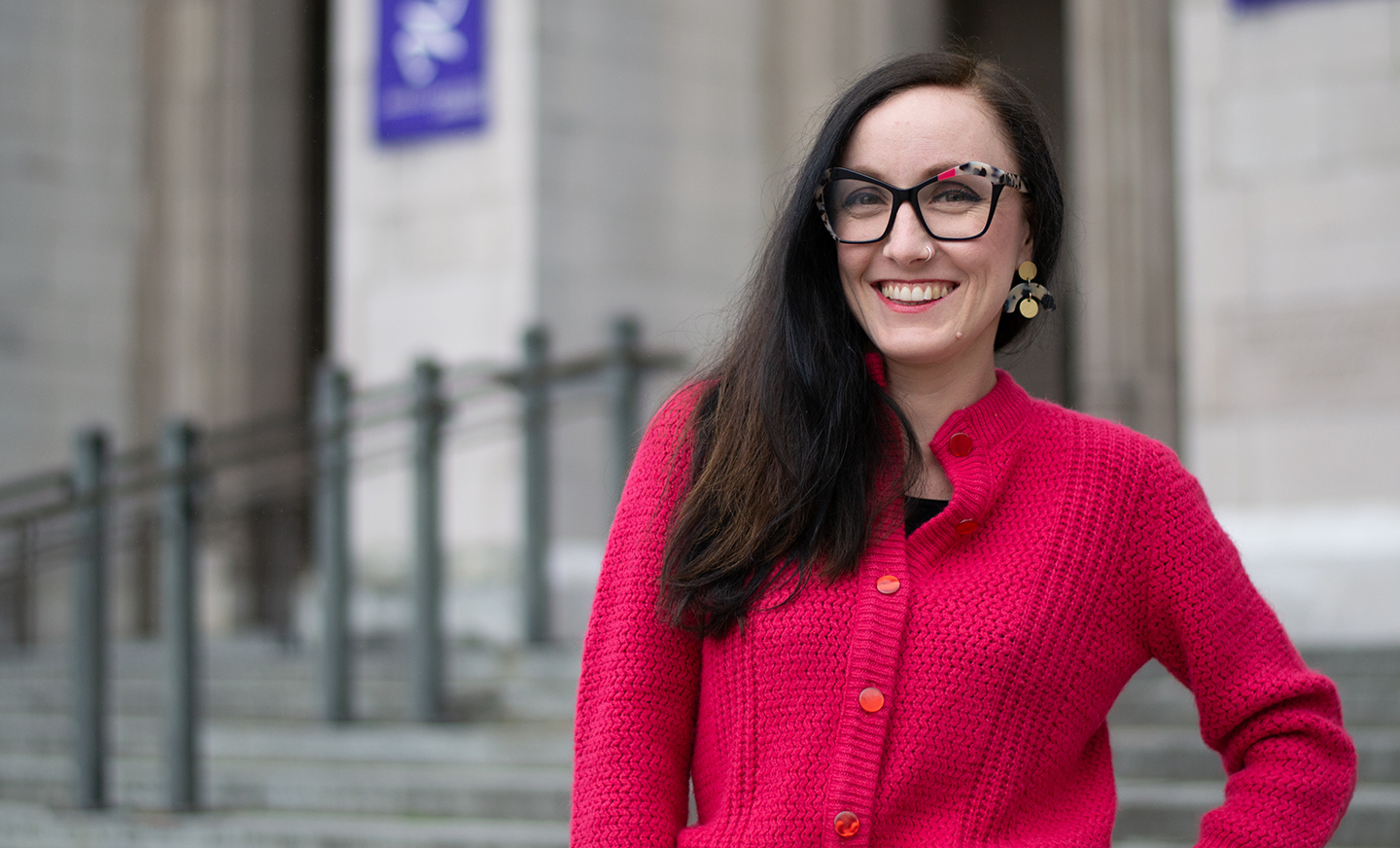Marika Cifor was drawn to the iSchool by its keen focus on social justice.
“No matter which area faculty work in, their research, teaching and service address urgent issues of social good, social justice, social importance, diversity, equity and inclusion. That’s what centers my own research and my commitment to doing work in the information field,” says the new iSchool faculty member, a specialist in archival and digital studies.
She brings a strong voice and fresh perspective to her job as an assistant professor in the iSchool’s Master of Library and Information Science program.
“Historically, the iSchool has had a really strong MLIS program, but it has not always centered on archives," says Cifor. “I knew I could bring a different approach to the faculty's leading research on the relationships of people, information and technology."
Her approach is that of feminist activist scholar. “This orientation centers on an interrogation of power around gender, sexuality, race, class, ethnicity, ability – all kinds of categories in difference,” says Cifor. “I see my academic work as a way to collaborate with and serve activists in fundamental ways.”
Cifor’s strength in archival studies, digital studies, and studies of gender, sexuality and race are increasingly important to the information field, says iSchool Dean Anind Dey. “She will help the iSchool address the growing student demand for these topics.”
Traditionally, the archivist’s role of collecting, arranging, describing, presenting and preserving records was cast as strictly objective, performed by impartial recordkeepers grounded in neutrality. No biases and no politics: their job was to record, not interpret.
Cifor is part of a new wave of scholars and practitioners challenging those assumptions. She poses probing questions. What should be the relationship of the recordkeeper and record subject? What should be in an archive that isn’t, and why? What is in it that shouldn’t be, for cultural and privacy issues? Should racist descriptions in an archive be eradicated or preserved and re-explained in new language? What records need to be rethought to more authentically serve the people and communities they are meant to represent? Should archivists showcase how their own thinking has evolved in records and descriptions?
“Moving beyond neutrality has allowed us to think critically about our practice, and about how we introduce others to the profession. It’s a fundamental shift,” says Cifor, who comes to the UW from Indiana University, where she served as assistant professor of information and library science.
Colleagues comment on her sharp intellect. “To state that she is a force to be reckoned with in the study of information, archives, and digital cultures is the proverbial understatement,” says Mario H. Ramirez, head of special collections and archives in the John F. Kennedy Memorial Library at California State University, Los Angeles.
Ramirez met Cifor when both were working on doctorates in information studies at the University of California, Los Angeles. They also collaborated at Indiana University, where he went for post-doctoral work.
“Archives are a key component to AIDS activism. It keeps knowledge from being marginalized, suppressed, forgotten.”
“To work alongside Marika is to challenge oneself to be more rigorous and thoughtful, and to be even more engaged with a scholarship and pedagogy that is multidisciplinary, erudite, and socially aware and invested,” says Ramirez.
During undergraduate and graduate studies, Cifor worked with multiple community, government and academic archives in Boston, Los Angeles, New York and San Francisco, focusing on LGBTQ archives and special collections. In L.A., she worked on a collaboration between UCLA Libraries, the Center for the Study of Women, and the June L. Mazer Lesbian Archives that concentrated on a community collection with personal papers, videotapes, artwork, manuscripts, softball uniforms – and a pair of Birkenstocks. Collectively, the records told the story of lesbian life in California. Cifor documented the oral histories of the founders and community archivists who run the Mazer Archives, asking what they wanted and didn’t want in their collections, and bonding with them as an insider and an outsider to their community. She developed an important relationship of trust.
“An archivist must empathize with all the stakeholders, while taking into account differential relations to power,” says the scholar, who advocates a “feminist ethics of care” approach to archiving. “In this practice, the archivist maintains an openness to being affected and shaped by another’s experiences, without blurring the lines between the self and the other.”
Cifor is currently working on a book and digital project, Viral Cultures: Activist Archives at the End of AIDS (under contract, University of Minnesota Press). It explores three New York City archives documenting HIV/AIDS activism during the 1980s-’90s. She examines how artists, archivists and activists are using the collections now in contemporary efforts to frame the epidemic not just as a phenomenon of that past, but as an ongoing emergency across the world.
“Archives are a key component to AIDS activism,” says Cifor. “It keeps knowledge from being marginalized, suppressed, forgotten.”
Cifor was drawn to activism as an undergraduate at all-female Mills College in Oakland, California. “My education had a strong grounding in thinking very critically and intersectionally about race and gender and ethnicity. It’s the place where I realized that activist work was the kind of academic work I wanted to do.”
Now it’s her turn to cultivate new generations of critical thinkers at the iSchool, teaching courses that balance theoretical work with hands-on practice. Seattle, she says, is ripe with exciting community archives work for students to participate in.
“Nothing reinforces the significance of the work we do more than to try your hands at those archival practices and get familiar with the histories of how they came to be and how to navigate the questions one faces as a professional.”
